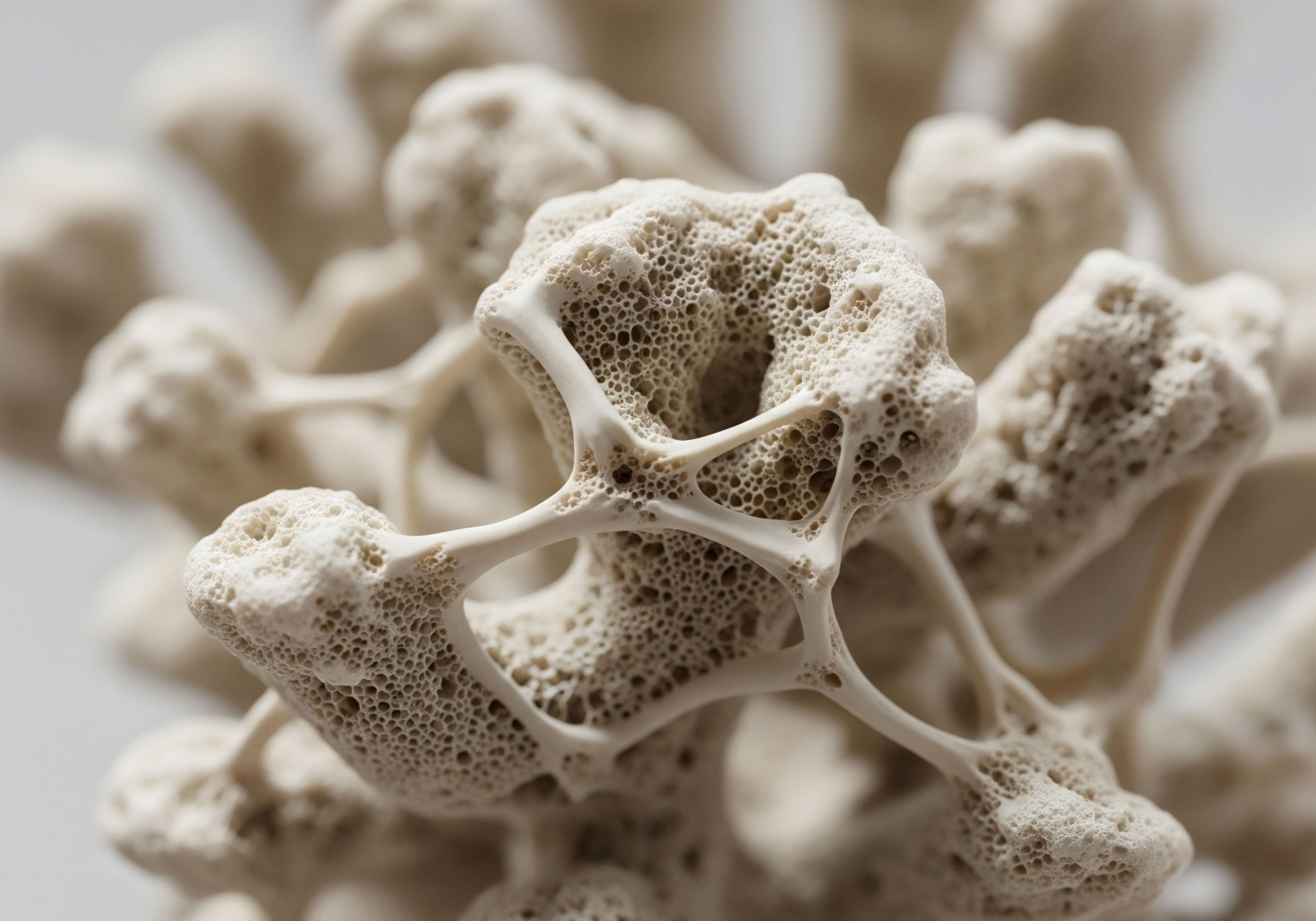

Fundamentals
The feeling of your mental sharpness diminishing can be a deeply personal and unsettling experience. One moment, a name is on the tip of your tongue; the next, it has vanished. You might find your focus drifting during a meeting or the mental stamina to work through a complex problem waning sooner than it used to.
These experiences are valid, and they often point toward subtle shifts within your body’s intricate communication network. One of the most significant of these shifts for a man is the gradual decline of testosterone. This powerful hormone does far more than build muscle; it is a key regulator of brain function, influencing everything from mood and motivation to memory and analytical thought. Understanding this connection is the first step toward reclaiming your cognitive vitality.
Testosterone acts directly on the brain, which is rich with androgen receptors. Think of these receptors as docking stations and testosterone as the key. When testosterone binds to these receptors in areas like the hippocampus and prefrontal cortex, it initiates a cascade of biochemical events that support neuronal health.
It helps protect brain cells from injury, promotes their growth and survival, and modulates the activity of neurotransmitters, the chemical messengers that govern how our brain cells communicate. When testosterone levels decline with age, there are fewer keys to turn these locks, and the cognitive processes that depend on them can become less efficient.
This can manifest as the ‘brain fog’ or mental fatigue you may be experiencing. The clarity you once took for granted feels just out of reach because a fundamental biological support system is changing.

What Is the Direct Link between Testosterone and the Brain?
The relationship between testosterone and cognitive function is grounded in its role as a neurosteroid. This means it is both produced within the brain and has profound effects on its structure and function. It helps maintain the myelin sheath that insulates nerve fibers, allowing for rapid and efficient communication between different brain regions.
A healthy level of this hormone is associated with better verbal memory, processing speed, and spatial abilities. Therefore, a decline in testosterone is not just a hormonal issue; it is a neurological one. The cognitive symptoms you feel are real biological signals that your brain’s internal environment is shifting. Recognizing this allows us to move the conversation toward proactive strategies that support both your endocrine and nervous systems.
A decline in testosterone directly impacts the brain’s chemical architecture, affecting memory, focus, and mental clarity.
The encouraging truth is that the body is a highly adaptable system. While the age-related decline in testosterone is a natural process, the severity of its cognitive impact can be significantly influenced by lifestyle. The same strategies that support overall health provide the raw materials and the right environment for your body to optimize its hormonal function and protect your brain.
These strategies are not about fighting against the aging process, but about working intelligently with your biology to maintain high function. We can think of this as building a biological reserve, a foundation of health so robust that it buffers against the cognitive effects of hormonal changes.
The four pillars of this foundation are nutrition, physical activity, sleep, and stress modulation. Each one sends powerful signals to your body that can help recalibrate your internal systems for better performance, both physically and mentally.


Intermediate
To appreciate how lifestyle strategies can mitigate the cognitive effects of declining testosterone, we must look at the underlying mechanisms. These interventions are not merely suggestions for healthy living; they are targeted inputs that directly influence the body’s endocrine and neurological systems.
They work by optimizing the body’s internal environment to support hormone production, enhance receptor sensitivity, and reduce systemic stressors that accelerate cognitive decline. By understanding the ‘how,’ you can approach these lifestyle changes with intention, recognizing them as powerful tools for biological recalibration.
Physical activity, particularly resistance training, is a potent stimulus for the endocrine system. Lifting heavy weights creates a cascade of physiological responses, including an acute increase in testosterone production. This process also increases the density and sensitivity of androgen receptors in both muscle and brain tissue.
This means that the testosterone your body does produce is used more effectively. Aerobic exercise complements this by improving blood flow to the brain, delivering essential oxygen and nutrients while clearing metabolic waste. It also boosts levels of Brain-Derived Neurotrophic Factor (BDNF), a protein that acts like a fertilizer for brain cells, promoting their growth and strengthening connections. Thus, a comprehensive exercise regimen supports both the production and the utilization of the hormones that are vital for cognitive function.

How Do Nutrition and Sleep Directly Fuel Hormonal Health?
Nutrition provides the essential building blocks for hormones. Testosterone itself is synthesized from cholesterol, and a diet deficient in healthy fats can impair its production. Specific micronutrients play critical roles as cofactors in this process.
Zinc, for instance, is integral to the function of the enzymes that produce testosterone, while Vitamin D acts more like a steroid hormone itself, with receptors found throughout the body, including the brain and testes. A diet rich in these nutrients, along with antioxidants from fruits and vegetables, helps protect the testes’ Leydig cells, where testosterone is produced, from oxidative stress. This protects the very factory where your body’s primary androgen is made.
Strategic lifestyle choices can directly enhance the body’s ability to produce and effectively use testosterone for cognitive wellness.
Sleep is perhaps the most critical period for hormonal regulation. The majority of daily testosterone release occurs during deep sleep. Consistently poor sleep disrupts the natural circadian rhythm of the Hypothalamic-Pituitary-Gonadal (HPG) axis, the sophisticated feedback loop that governs testosterone production.
Chronic sleep deprivation leads to elevated cortisol levels, a stress hormone that has a direct antagonistic relationship with testosterone. By prioritizing deep, restorative sleep, you are providing the precise conditions your body requires to perform its essential hormonal maintenance and production cycles. This nightly reset is fundamental to both your hormonal balance and your cognitive performance the following day.
The following table outlines how specific lifestyle interventions influence both hormonal and cognitive health markers, demonstrating their interconnected benefits.
| Lifestyle Intervention | Impact on Hormonal Health | Impact on Cognitive Function |
|---|---|---|
| Resistance Training |
Stimulates acute testosterone production; increases androgen receptor sensitivity. |
Improves executive function and processing speed; may increase BDNF. |
| Nutrient-Dense Diet |
Provides precursors (e.g. zinc, Vitamin D, healthy fats) for testosterone synthesis. |
Reduces neuro-inflammation; provides antioxidants to protect brain cells. |
| Adequate Sleep |
Maximizes testosterone release; regulates the HPG axis; lowers cortisol. |
Consolidates memory; clears metabolic waste from the brain (glymphatic clearance). |
| Stress Management |
Lowers chronic cortisol levels, which are catabolic and suppress testosterone. |
Improves focus and mood; protects the hippocampus from cortisol-induced damage. |
Understanding these mechanisms transforms lifestyle choices from passive habits into active, therapeutic interventions. You are not just eating well or getting more sleep; you are strategically managing your biochemistry to support the very systems that govern your mental clarity and vitality.


Academic
A deeper analysis of testosterone’s role in male cognitive health requires a systems-biology perspective, moving beyond the hormone itself to examine its intricate relationship with metabolic function and neuro-inflammation. The cognitive changes associated with declining testosterone are often amplified by concurrent metabolic dysregulation, particularly insulin resistance.
This creates a self-perpetuating cycle where low testosterone contributes to increased visceral fat and insulin resistance, which in turn further suppresses testosterone production and promotes a pro-inflammatory state that is detrimental to neuronal health. Lifestyle interventions are exceptionally effective because they target multiple nodes within this complex network simultaneously.
One of the key players in this dynamic is Sex Hormone-Binding Globulin (SHBG). SHBG is a protein that binds to testosterone in the bloodstream, rendering it biologically inactive. With age, SHBG levels tend to rise, meaning that even if total testosterone levels remain stable, the amount of “free” or bioavailable testosterone available to act on the brain decreases.
This is where metabolic health becomes paramount. High insulin levels, a hallmark of insulin resistance, are known to suppress SHBG production by the liver. While this might seem beneficial at first glance, the underlying insulin resistance and associated inflammation are profoundly damaging to the brain.
Lifestyle strategies, particularly a low-glycemic diet and regular exercise, improve insulin sensitivity. This helps normalize the relationship between insulin and SHBG, but more importantly, it reduces the systemic inflammation and oxidative stress that are primary drivers of cognitive decline.

Can Lifestyle Changes Outperform Hormonal Intervention Alone?
The neuro-inflammatory hypothesis of cognitive decline provides a compelling rationale for the efficacy of lifestyle strategies. Low testosterone is associated with an increase in pro-inflammatory cytokines, both systemically and within the central nervous system. These inflammatory messengers can impair synaptic plasticity, reduce the production of neurotransmitters, and even contribute to the pathology of neurodegenerative diseases.
Lifestyle interventions are powerful anti-inflammatory modulators. For example, omega-3 fatty acids from fish oil are converted into resolvins and protectins, which are potent anti-inflammatory signaling molecules. Exercise itself has an anti-inflammatory effect by promoting the release of myokines from muscle tissue, which help dampen systemic inflammation. By addressing the inflammatory component of hormonal decline, these strategies protect the brain’s microenvironment, making it more resilient.
The interplay between testosterone, metabolic health, and inflammation is a critical factor in cognitive aging.
Therefore, the question of mitigating cognitive decline becomes a matter of addressing the entire system. While Testosterone Replacement Therapy (TRT) can restore hormonal levels and show cognitive benefits, its success is often enhanced when combined with a healthy lifestyle.
In some cases, particularly when cognitive symptoms are driven more by inflammation and metabolic issues than by a profound testosterone deficiency, lifestyle interventions alone can produce significant improvements. They address the root causes of the systemic dysfunction that testosterone decline is a part of. The table below summarizes key research findings on the association between testosterone, lifestyle factors, and health outcomes.
| Factor | Associated Findings from Research | Primary Mechanism |
|---|---|---|
| Low Free Testosterone |
Associated with poorer cognitive function, particularly in older men. |
Reduced direct neuroprotective and signaling effects in the brain. |
| Increased Visceral Fat |
Strongly associated with lower total and free testosterone levels. |
Aromatase enzyme in fat tissue converts testosterone to estrogen; fat releases inflammatory cytokines. |
| Insulin Resistance |
Associated with decreased SHBG and often accompanies low testosterone. |
Disrupts the HPG axis and promotes systemic inflammation. |
| Vigorous Exercise |
Associated with higher levels of total testosterone and SHBG. |
Stimulates the HPG axis, improves insulin sensitivity, and reduces inflammation. |
Ultimately, a comprehensive approach that integrates lifestyle modification is the most robust strategy. It recognizes that testosterone is one vital component of a much larger, interconnected system. By optimizing metabolic health and reducing inflammation, we create an internal environment where the brain can thrive, regardless of age-related hormonal shifts.

Key Physiological Pathways
Understanding the pathways involved provides a clearer picture of how lifestyle interventions exert their effects. These are not abstract concepts but tangible biological processes that can be influenced.
- The Hypothalamic-Pituitary-Gonadal (HPG) Axis ∞ This is the central command line for testosterone production. Chronic stress and poor sleep dysregulate this axis, primarily through the overproduction of cortisol. Lifestyle management directly supports the healthy, rhythmic function of this system.
- Aromatase Conversion ∞ The enzyme aromatase, found predominantly in fat tissue, converts testosterone into estrogen. Higher body fat percentage leads to more aromatase activity, effectively lowering testosterone levels. Reducing body fat through diet and exercise directly mitigates this conversion.
- Neurotransmitter Modulation ∞ Testosterone influences the levels of key neurotransmitters like dopamine and serotonin, which are critical for mood, motivation, and cognitive function. By supporting healthy testosterone levels, you are also supporting a more balanced neurochemical environment.

References
- RightPatient. “TRT as a Solution for Age-Related Testosterone Decline.” 7 Apr. 2025.
- Iwasaki, T. “The impact of testosterone in men’s health.” Journal of Japanese Society of Men’s Health, 2021.
- Vaughan, C. et al. “Hormonal and Metabolic Changes of Aging and the Influence of Lifestyle Modifications.” Endocrinology and Metabolism Clinics of North America, vol. 46, no. 4, 2017, pp. 797-819.
- Yeap, B. B. “Role of testosterone in older men ∞ recent advances and future directions.” Expert Review of Endocrinology & Metabolism, vol. 4, no. 2, 2009, pp. 131-140.
- Legros, J. J. and G. Timsit-Berthier. “Testosterone treatment in the aging male ∞ myth or reality?” Revue Médicale de Liège, vol. 62, no. 5-6, 2007, pp. 434-439.

Reflection
The information presented here provides a map of the biological territory connecting your hormones, your lifestyle, and your cognitive vitality. This map is built from decades of clinical research, yet its true value is realized when you begin to overlay it onto your own life.
The journey toward sustained mental clarity is a personal one, guided by an increasing awareness of how your daily choices write your biological story. The knowledge you have gained is the starting point, the tool that allows you to ask more precise questions and make more intentional decisions.
What you do with this understanding, how you apply it to your own unique physiology and circumstances, is the path forward. Your body is constantly communicating with you through the symptoms you feel. The opportunity now is to learn its language and begin a more collaborative dialogue, one that fosters resilience and function for years to come.

Glossary

androgen receptors

testosterone levels

cognitive function

lifestyle strategies

cognitive decline

lifestyle changes

testosterone production

brain-derived neurotrophic factor

leydig cells

lifestyle interventions

neuro-inflammation

hpg axis

insulin resistance

sex hormone-binding globulin

testosterone decline




